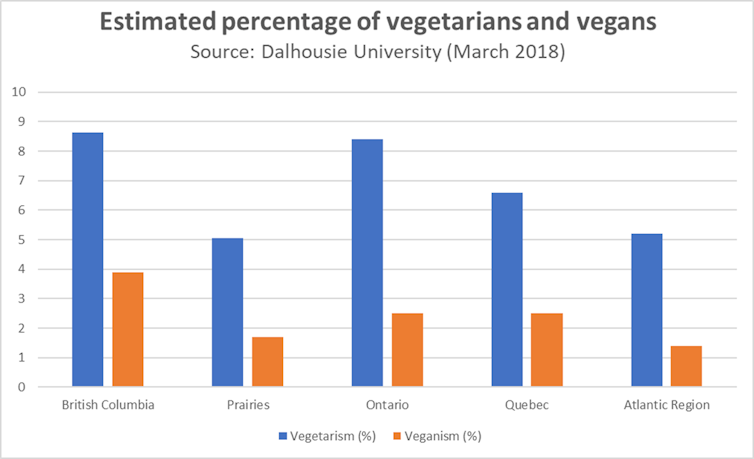This article was originally published on , which features includes relevant and informed articles, written by researchers and academics in their areas of expertise and edited by experienced journalists.
is a professor in food distribution and policy at ºÚÁϳԹÏÍø.
Many of us have been dedicated to our favourite protein source for years. But other sources of protein are emerging as potent alternatives to animal protein.
Demand is up for vegetable proteins like pulses, as well as
Loblaw has even , apparently trying to take insect consumption mainstream.
As a result, some believe vegetarianism and veganism may be on the rise in Canada. Not so much, it seems.
According to it appears that the number of vegetarians and vegans have remained the same over the last decade or so, but the number of Canadians who follow specific dietary practices is clearly on the rise over the last few years.

Results suggest that 7.1 per cent of Canadians consider themselves vegetarians, and 2.3 per cent vegans. with conducted over the last decade or so.
Vegetarians maintain a meat-free diet, while vegans also abstain from any animal or animal-derived products, including dairy, eggs and even honey. We should note that there are several variations of vegetarianism and veganism. But even if these percentages are not shockingly high, there is some indication that things may get more complicated in the future.
Results show that 32 per cent of Canadians do observe some sort of committed dietary regime. This number is one of the highest we’ve seen in recent years.
More women than men eschewing meat
Women are 1.6 times more likely to consider themselves vegetarian or vegan than men.
Level of education also seems to be a significant determinant. People with a university degree are three times more likely to consider themselves vegetarians or vegans than those with a high school diploma.
Consumers living in British Columbia are three times more likely to identify as vegetarians or vegans than consumers living in the Prairies or the Atlantic Region.
Wealthier people also seem to commit more to specific diets. Consumers who earn more than $150,000 per year are twice as likely to consider themselves vegetarians or vegans than consumers earning less than $80,000.
Nothing very surprising here, but younger people are really making things interesting.

Those under 35 are three times more likely to consider themselves vegetarians or vegans than those 49 or older. That’s a significant number.
A rise in food allergies
Experts argue that the rise of speciality diets is due to consumers associating vegetarianism and veganism not just with animal welfare, as they did in the past, but also with healthier and cleaner products.
Others are simply rejecting the model of industrialized agriculture altogether. And health appears increasingly to be a factor.
In fact, the poll suggests that more than 12 per cent of Canadians are diabetic. Consumers aged 49 and up are twice as likely to adopt a diabetic diet over time than those under the age of 35, and many diabetics choose meat as a lean protein in their carbohydrate-reduced diets. As our population gets older, it is difficult to see how that number could drop anytime soon.
Questions concerning food allergies also garnered interesting results.
Almost 12 per cent of Canadians mentioned having allergies, and more than 20 per cent of households with more than two children said they had to constantly be on the lookout for allergens. These are alarming results.
For many years now, allergens have been a nightmare for food companies and the Canadian Food Inspection Agency alike. So far, in 2018, of the issued by federal regulators, almost a third were due to the presence of ingredients undeclared on the label.
Oddly though, consumers in the Prairies are twice as likely to suffer from food allergies than those in Quebec.
Religion can drive food choices
Religious beliefs are also enticing Canadians to choose specialty products like halal or kosher foods, but results show these categories remain somewhat marginal.
A total 2.3 per cent of Canadians mentioned eating halal foods regularly while less than one per cent choose kosher products. Supply remains an issue across the country, as halal and kosher foods are not always readily available. But with , this could change.
Obviously, this is just one survey that polled only 1,049 Canadians. As with any survey, results must be taken with a grain of salt, no pun intended.
Still, these results point to a much more heterogeneous food demand than we have seen in recent years.
No wonder Air Canada now offers several for its international flights. Catering companies and restaurants also know very well that serving patrons is an art that is slowly becoming more about customizing servings than delivering a standardized meal.
![]() So if you’re one of those who have no specific dietary needs of any sort, you are still in the majority. But with a younger generation seeking more dietary nuances, expect to see major changes in food offerings over the next decade or so.
So if you’re one of those who have no specific dietary needs of any sort, you are still in the majority. But with a younger generation seeking more dietary nuances, expect to see major changes in food offerings over the next decade or so.
Read the on The Conversation.
ºÚÁϳԹÏÍø is a founding partner of The Conversation Canada, a new-to-Canada online media outlet providing independent, high-quality explanatory journalism. Originally established in Australia in 2011, it has had more than 85 commissioning editors and 30,000-plus academics register as contributors. A full list of articles written by ºÚÁϳԹÏÍøacademics can be found on .

